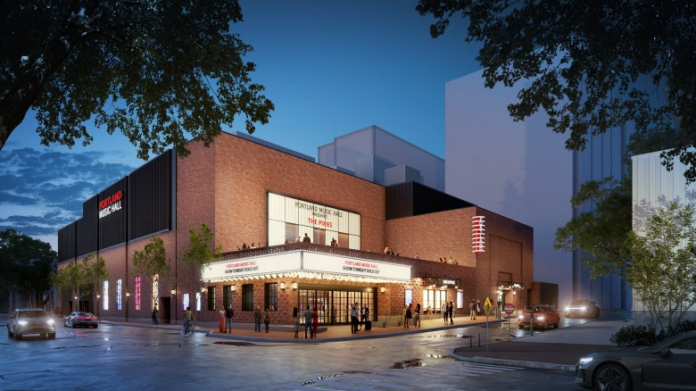A Portland City Council committee held its first public discussion Tuesday on the future of a moratorium that halted a controversial Live Nation project earlier this year.
Councilor Sarah Michniewicz presented a proposal to amend the city code to establish an Entertainment Sector Benefit Agreement. The agreement would require large venues to contribute a percentage of ticket prices to support public transportation, local entertainers and independent venues. Discussions Tuesday primarily orbited around that proposal.
Michniewicz and Councilor Ben Grant first proposed the amendment in September, on the night the moratorium was approved. Tuesday night was the first time since then that councilors met publicly to discuss the proposal, which is the only plan that has been advanced so far to resolve the issues that prompted the moratorium.
The proposal aims to address concerns raised by residents about a possible new Live Nation venue. Those concerns led the council to enact a six-month moratorium on music venues with capacities of more than 2,000 people.
Under the amendment, all music venues would be required to enter into an Entertainment Sector Benefit Agreement as a condition of receiving a large-capacity entertainment license.
Funds collected through the agreement would be split between Metro, the regional bus service, and a newly created Entertainment Sector Trust Fund, which would support small performance venues and local artists.
FEE STRUCTURE
The amount a venue would pay depends on its capacity, but the proposal would only impact venues that hold 2,000 people or more.
Venues with 2,000 to 2,499 seats would contribute 1% of the base ticket price: those with 2,500 to 2,999 seats would pay 1.5%; and venues with 3,000 or more seats would pay 2%. The base ticket price excludes taxes and third-party fees.
For example, a venue with a capacity of 2,200 that sells 1,500 tickets at $50 and 700 tickets at $75 would owe the city $1,275 under the 1% fee.
Michniewicz said the Cross Insurance Arena and Thompson’s Point would be affected by the amendment if it passes. The committee did not vote on the proposal Tuesday.
Last winter, Live Nation — one of the country’s largest concert promoters — submitted plans for a 3,300-seat indoor music venue on a site currently used for parking at the corner of Cumberland Avenue and Myrtle Street in downtown Portland. The $75 million project, to be developed with Mile Marker Investments, would host about 125 shows a year and bring major touring acts to the city.
The proposed venue drew intense public reaction. Supporters said it would energize downtown and boost local businesses, while opponents worry that it would drive up rents, worsen traffic, and threaten smaller, independent music venues.
In August, after hours of public comment, the City Council approved the 180-day moratorium, effectively pausing Live Nation’s proposal. The measure bars the city from accepting or approving applications for new theaters or music halls with capacities over 2,000 seats while officials review zoning, parking and the potential impact on Portland’s arts community.
Following the council’s vote, the planning board tabled the project until March 24, 2026 — its first meeting after the moratorium expires — citing the need for clarity on how the moratorium applies. Live Nation’s attempt to resubmit its application was declined by the board, leaving the project stalled.
During Tuesday’s meeting, councilors expressed interest in finding a legislative solution to address concerns of the local arts community while allowing a large music venue to move forward — a move city staff said could benefit the economy.
CHALLENGES AHEAD
Michniewicz said while the goal is not to pass the fee on to consumers, ticket buyers would likely feel some of the cost.
“Ideally it would not come out of the consumer’s pocket, but ultimately most likely it would be a dollar or two that would,” she said. “We all have fee fatigue. None of us like that. But if I were buying a ticket, I’d rather pay into a fund that supports the Portland arts community than other fees.”
Other councilors voiced concern about consumers being burdened with a new fee, preferring that large concert promoters bear the cost.
“They could basically just have another fee and put that onto the consumer,” said Councilor Wes Pelletier. “Third-party fees are already a large part of ticket prices these days.”
Councilor Pious Ali, who chairs the committee, encouraged members to bring forward additional proposals at the next meeting. Committee members hope to have a long-term solution in place when the moratorium ends in March.
So far, the proposal brought forth by Grant and Michniewicz is the only one on the table.
Ali said he plans to schedule more frequent committee meetings over the coming months to expedite work on proposals related to the moratorium.


